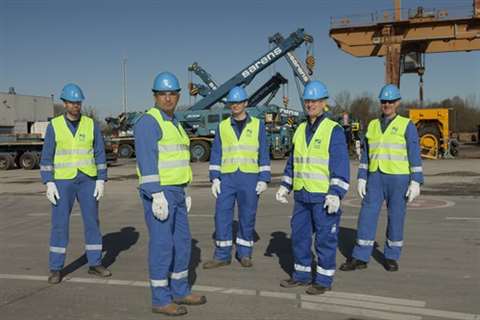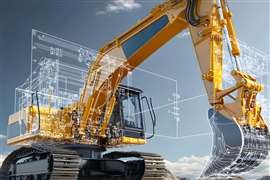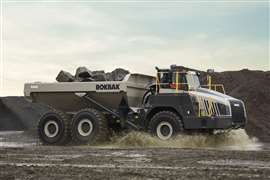Sponsored Content - Sarens in Belgium completes 300 consecutive days of safety
03 December 2018

October 2018: Saren’s top priority for any operation, anywhere in the world, is safety. That is why the Group is pleased to share that Sarens in Belgium has so far achieved 300 consecutive days of safety. The Sarens management team in Belgium shares how they did it:
Sarens in Belgium just completed 300 consecutive safe days without delays. How did you accomplish this feat?
As a company, it is always our goal to work without accidents. It is thanks to the performance of every employee at the company that we were able to accomplish this feat. We want to thank:
- Operators, by making the right decisions on a daily basis
- The project operations department, by preparing carefully so that our operators are not forced into bad situations
- The rental operations department, through correct planning, guiding and coaching of our operators
- The fleet department, by making sure our equipment is in good shape
- The sales department, by discussing safety as the first step in a project
- The HR department, by recruiting the right people
- The SHEQ department, by improving safety on a daily basis
- Last but not least, all of the supporting departments that make it possible for everyone here to perform their work safely
What resources does the company commit to ensure safety?
Safety is not a matter of one or two people, but the entire company. Our SHEQ manager, Inge Janssens, and SHEQ coordinator, Sven Van De Velde, are the gatekeepers who guide all operational personnel to make the right and safe decision every single moment of the day.
What is your ‘Stop and Consult’ process about? Can you describe it briefly?
When we conduct the Last Minute Risk Analysis, we need to be aware of all the risks we are about to take and whether enough mitigating actions have been taken.
When it is unclear whether the action can be started in a safe manner, we stop and consult our colleagues along the hierarchical line about how to proceed.
That’s what ‘Stop and Consult’ is all about: when we recognise a risk, we stop and evaluate whether we can continue in a safe way. If it is not possible to do so, we encourage all of our people to consult the next person up in the hierarchy in order to find a way forward.
How do you create safety awareness and motivate employees to follow safe practices?
As a management team, we also constantly remind all of our people to think before they act. Safety awareness can only be created when you constantly bring safety to everyone’s attention. Furthermore, we encourage our managers to be present on site and to lead by example. Finally, it is essential to encourage safe behaviour and to create an environment where people dare to communicate their ideas about safety. When employees have ideas for improvements, we try to be open to them and think together about how to improve safety.
What kind of safety training do you provide to employees?
All employees who are in direct contact with operating activities (including, of course, our operators) have followed a safety training for operational managers (VCA-VOL). Furthermore, every role receives adapted training on topics that are relevant to them: for example, depot supervisors learn how to investigate incidents and operators learn to work safely at height.
Tell us about your SHEQ team.
Inge Janssens is our experienced SHEQ Manager. She has been working for the company for over 13 years. She can always be contacted and tries to help in a constructive way. With her whole heart, she represents the mentality of how safety should be approached. Since August, she has had a new sidekick: Sven Van De Velde. With his history of working in a hospital, he has the right approach to critically evaluate situations on safety.
What will be the next safety accomplishment for Belgium?
The next safety accomplishment will be for us to achieve a full year without accidents. However, it is essential to keep working safely in order to avoid every accident.
If an accident were to take place, how would it be handled?
First, a thorough investigation would need to take place. Next, a toolbox pertaining to the accident would be shared and the necessary structural steps taken and followed up on within the organisation so that it doesn’t happen again. To help do this efficiently, we are currently implementing a new safety tool which ensures that all necessary actions are taken.
On projects where we are responsible for the entire process, we can follow our safety principles. But how difficult is it to ensure safety while working on rental projects?
It is a main challenge to convince our operators that while helping the client is a main goal, we will always support them in not helping the client if there is a cost to their safety. It can be difficult, however, to apply the ‘Stop and Consult’ procedure if the client is pushing towards an unsafe situation. Training and guiding of our new operators is essential for preventing accidents during rental projects.




